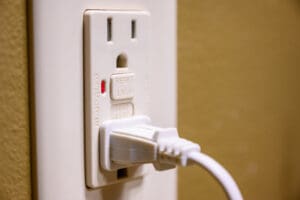Understanding GFCIs In Plain English For Local NJ Property Owners
As a licensed New Jersey home inspector (property inspector, historic/vintage home inspector, commercial building inspector) based in Maplewood and Essex County, NJ, I’ve not only undergone rigorous training and certification, but I have seen a lot of different electrical setups in my local NJ Home Inspection experience. In this post, let’s take a look at Ground Fault Circuit Interrupters, or let’s pursue understanding GFCIs, in plain English. These nifty devices are like the safety guards of your electrical system, keeping an eye out for trouble and stepping in when things go awry.
So, what’s a ground fault? Imagine your electrical current is flowing happily along its designated path, but suddenly, it decides to take a detour. This unexpected diversion can happen due to various reasons like a faulty appliance, bad wiring or water getting where it shouldn’t. Now, here’s the problem: if you happen to become part of this detour, you could get zapped, and not in a fun way. That’s where the GFCI comes into play. It’s like having a watchdog that’s constantly checking if the current is behaving as it should. The moment the GFCI senses something fishy, like an imbalance in the flow of electricity, it slams the brakes and cuts off the power faster than you can blink. This lightning-fast reaction helps prevent serious accidents like electric shocks or worse.
GFCI Safety For NJ Property Owners
Understanding GFCIs is really about prioritizing safety. Faulty appliances, old or bad wiring and/or water getting into electrical areas of the home or property is common. To be extra safe and as an example, GFCIs should be installed in places where water and electricity could mingle, such as bathrooms, kitchens, outdoor outlets, and in garages or sheds. They are there to add that extra layer of protection in the home or property that will avoid those detours and help to keep you, your friends, family and loved ones – all safe!
Install GFCIs Right
Like we said, understanding GFCIs is about safety. And when it comes to the installation of a GFCI, it and anything to do with an electrical system is not something to ever take lightly. While it can be a DIY-friendly task for some, electrical systems are not simple and they can become unsafe real quick. Rather, it’s always wise to call in the pros when it comes to anything “electric.” As a licensed New Jersey home inspector, I highly recommend consulting a qualified electrician for any electrical work in the home and/or in offices and buildings.
If you’re itching to tackle it yourself, best to just stick to replacing a 3-pronged, grounded outlet with a GFCIs. But for those older two-pronged outlets, it is best to leave it to the pros. These are going to need a little more electrical experience love and attention. Remember, safety always comes first!
For Home Inspections | Building Inspections – Contact Rooney Home Inspections!
Evaluating electrical systems, including GFCIs, in a Home Inspection or a Building Inspection is paramount. A thorough inspection not only ensures the safety of the occupants, but also prevents the potential for future hazards and also for costly repairs. Electrical systems are the lifeline of any home or buidling, providing the power necessary for lighting, appliances, machines and all the essential devices. Count on Rooney Home Inspections, based in Maplewood, NJ, as your licensed New Jersey home inspector. We inpect local as well the surrounding NJ towns such as South Orange, West Orange, Livingston, Millburn, and throughout Central and North NJ.

.png)
